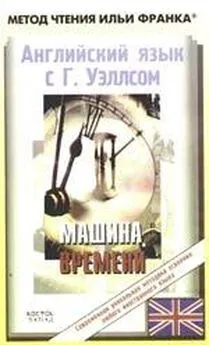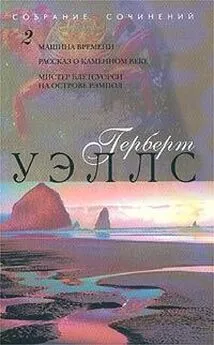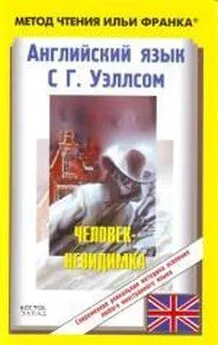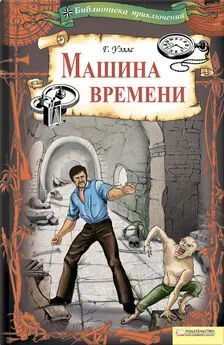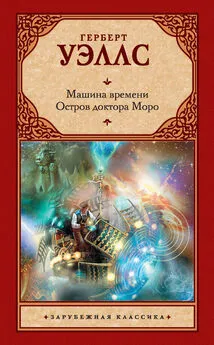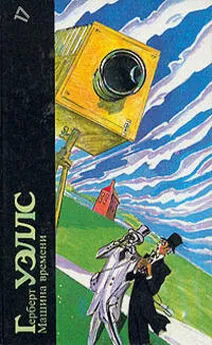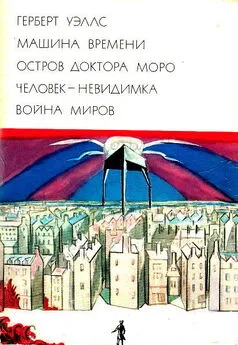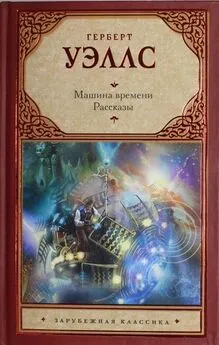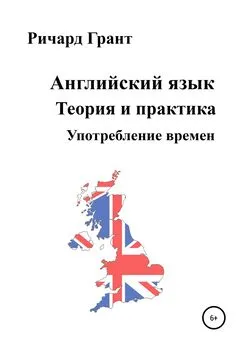H. Wells - Английский язык с Гербертом Уэллсом. Машина Времени
- Название:Английский язык с Гербертом Уэллсом. Машина Времени
- Автор:
- Жанр:
- Издательство:неизвестно
- Год:неизвестен
- ISBN:нет данных
- Рейтинг:
- Избранное:Добавить в избранное
-
Отзывы:
-
Ваша оценка:
H. Wells - Английский язык с Гербертом Уэллсом. Машина Времени краткое содержание
Английский язык с Гербертом Уэллсом. Машина Времени - читать онлайн бесплатно полную версию (весь текст целиком)
Интервал:
Закладка:
knuckle [nAkl], anguish [`xNgwIS], malachite [`mxlqkaIt]
'I think I must have had a kind of frenzy. I remember running violently in and out among the moonlit bushes all round the sphinx, and startling some white animal that, in the dim light, I took for a small deer. I remember, too, late that night, beating the bushes with my clenched fist until my knuckles were gashed and bleeding from the broken twigs. Then, sobbing and raving in my anguish of mind, I went down to the great building of stone. The big hall was dark, silent, and deserted. I slipped on the uneven floor, and fell over one of the malachite tables, almost breaking my shin. I lit a match and went on past the dusty curtains, of which I have told you.
'There I found a second great hall covered with cushions (дальше я обнаружил второй большой зал, устланный подушками), upon which, perhaps, a score or so of the little people were sleeping (на которых спали около двух десятков маленьких людей; score — зарубка, метка; двадесятка ). I have no doubt they found my second appearance strange enough (я не сомневаюсь, что они посчитали мое второе появление достаточно странным), coming suddenly out of the quiet darkness with inarticulate noises and the splutter and flare of a match (поскольку я внезапно вышел из спокойной темноты с нечленораздельными звуками, бессвязной речью и неровным пламенем спички; splutter — шум, суматоха; бессвязнаяречь, лепет; flare — яркий, неровныйсвет ). For they had forgotten about matches (а они уже забыли о спичках; to forget — забывать ).
inarticulate ["InR`tIkjqlqt], splutter [`splAtq], flare [fleq]
'There I found a second great hall covered with cushions, upon which, perhaps, a score or so of the little people were sleeping. I have no doubt they found my second appearance strange enough, coming suddenly out of the quiet darkness with inarticulate noises and the splutter and flare of a match. For they had forgotten about matches.
"Where is my Time Machine (где моя Машина Времени)?" I began, bawling like an angry child (начал я, крича во все горло, как рассерженный ребенок; to bawl — лаять, рычать; кричатьвовсегорло ), laying hands upon them and shaking them up together (хватая их руками и тряся всех вместе; to lay — класть, положить; to lay hands upon — положитьрукина/кого-либо/, хватать ). It must have been very queer to them (это, должно быть, было очень странным для них). Some laughed (некоторые смеялись), most of them looked sorely frightened (большинство казались крайне испуганными). When I saw them standing round me (когда я увидел их стоящими вокруг меня), it came into my head that I was doing as foolish a thing as it was possible for me to do under the circumstances (мне пришла в голову /мысль/, что я поступаю так безрассудно, как только возможно для меня в данных обстоятельствах; circumstances— обстоятельства ), in trying to revive the sensation of fear (стараясь пробудить в них чувство страха; torevive— оживать; оживить, пробудить ). For, reasoning from their daylight behaviour (делая вывод = исходя из их дневного поведения; toreason— рассуждать, размышлять; обосновывать, делать выводы ), I thought that fear must be forgotten (я подумал, что страх, должно быть, /ими/ позабыт).
bawl [bLl], angry [`xNgrI], circumstance [`sWkqmstxns], behaviour [bI`heIvjq]
"Where is my Time Machine?" I began, bawling like an angry child, laying hands upon them and shaking them up together. It must have been very queer to them. Some laughed, most of them looked sorely frightened. When I saw them standing round me, it came into my head that I was doing as foolish a thing as it was possible for me to do under the circumstances, in trying to revive the sensation of fear. For, reasoning from their daylight behaviour, I thought that fear must be forgotten.
'Abruptly, I dashed down the match (я резко бросил спичку; to dash — наноситьсокрушительныйудар; бросить, швырнуть ), and, knocking one of the people over in my course (и сбив с ног кого-то, /попавшегося/ на пути; to knock — ударять, бить; course — курс, направление, путь ), went blundering across the big dining-hall again (снова ощупью прошел по большому обеденному залу; to blunder — двигатьсяощупью, спотыкаться ), out under the moonlight (/и вышел/ на лунный свет). I heard cries of terror and their little feet running and stumbling this way and that (я услышал крики ужаса и /топот/ маленьких бегущих и спотыкающихся ног; to stumble — спотыкаться, оступаться ). I do not remember all I did as the moon crept up the sky (я не помню всего, что я делал, пока луна ползла по небу; to creep — ползать ). I suppose it was the unexpected nature of my loss that maddened me (полагаю, что это неожиданная сущность = неожиданность моей потери довела меня до безумия; toexpect— ожидать, предполагать; nature— природа, вселенная; сущность, основное свойство; tomadden— сводить с ума, довести до безумия ). I felt hopelessly cut off from my own kind (я чувствовал себя теперь безнадежно отрезанным от моего собственного вида = своих современников)—a strange animal in an unknown world (странным животным в неизвестном мире). I must have raved to and fro (должно быть, я как в бреду бросался в разные стороны; torave— бредить; неистовствовать, бесноваться ), screaming and crying upon God and Fate (вопя и крича на Бога и Судьбу; toscream— вопить, визжать ).
knock [nOk], blunder [`blAndq], stumbling [`stAmblIN]
'Abruptly, I dashed down the match, and, knocking one of the people over in my course, went blundering across the big dining-hall again, out under the moonlight. I heard cries of terror and their little feet running and stumbling this way and that. I do not remember all I did as the moon crept up the sky. I suppose it was the unexpected nature of my loss that maddened me. I felt hopelessly cut off from my own kind—a strange animal in an unknown world. I must have raved to and fro, screaming and crying upon God and Fate.
I have a memory of horrible fatigue (у меня осталось воспоминание об ужасной усталости), as the long night of despair wore away (по мере того, как эта длинная ночь отчаяния медленно тянулась; to wear away — стирать/ся/,ослаблять/ся/; медленнотянуться/овремени/ ); of looking in this impossible place and that (как искал в самых невероятных местах; impossible — невозможный, невыполнимый ); of groping among moon-lit ruins and touching strange creatures in the black shadows (как ощупью пробирался среди озаренных лунным светом развалин, натыкаясь на странные существа в черном полумраке; to grope — пробиратьсянаощупь; shadow — тень, полумрак ); at last, of lying on the ground near the sphinx and weeping with absolute wretchedness (как наконец упал на землю около сфинкса и рыдал в полном отчаянии; to weep — плакать, рыдать; wretched — бедный, несчастный; отчаянный ). I had nothing left but misery (у меня ничего не осталось, кроме страдания). Then I slept (затем я заснул), and when I woke again it was full day (а когда проснулся, уже был полный день = совсем рассвело; towake— просыпаться ), and a couple of sparrows were hopping round me on the turf within reach of my arm (и пара воробьев прыгала вокруг меня по дерну на расстоянии /вытянутой/ руки; tohop— подпрыгивать ).
fatigue [fq`tJg], wretchedness [`reCIdnqs], misery [`mIz(q)rI]
I have a memory of horrible fatigue, as the long night of despair wore away; of looking in this impossible place and that; of groping among moon-lit ruins and touching strange creatures in the black shadows; at last, of lying on the ground near the sphinx and weeping with absolute wretchedness. I had nothing left but misery. Then I slept, and when I woke again it was full day, and a couple of sparrows were hopping round me on the turf within reach of my arm.
'I sat up in the freshness of the morning (я сел, /овеваемый/ свежестью утра), trying to remember how I had got there (пытаясь вспомнить, как я попал сюда), and why I had such a profound sense of desertion and despair (и почему я ощущаю такое глубокое чувство одиночества и отчаяния). Then things came clear in my mind (затем события стали проясняться в моем сознании). With the plain, reasonable daylight (в ясном разумном дневном свете), I could look my circumstances fairly in the face (я смог спокойно взглянуть в лицо обстоятельствам). I saw the wild folly of my frenzy overnight (я увидел = понял всю дикую нелепость своего ночного безумия), and I could reason with myself (и смог рассуждать сам с собою).
profound [prq`faund], desertion [dI`zWS(q)n], despair [dI`speq]
'I sat up in the freshness of the morning, trying to remember how I had got there, and why I had such a profound sense of desertion and despair. Then things came clear in my mind. With the plain, reasonable daylight, I could look my circumstances fairly in the face. I saw the wild folly of my frenzy overnight, and I could reason with myself.
"Suppose the worst (предположим самое худшее)?" I said (сказал я). "Suppose the machine altogether lost—perhaps destroyed (предположим, что машина навсегда утеряна — может быть, уничтожена; to lose — терять )? It behoves me to be calm and patient (мне следует быть спокойным и терпеливым; to behove — надлежать, следовать ), to learn the way of the people (изучить образ /жизни/ этих людей), to get a clear idea of the method of my loss (получить ясное представление о том, как /произошла моя/ потеря), and the means of getting materials and tools (и как /найти/ средства получения необходимых материалов и инструментов); so that in the end, perhaps, I may make another (чтобы, в конце концов, я, может быть, сумел сделать другую /машину/)." That would be my only hope, perhaps (возможно, это будет моей единственной надеждой; only — только; the only — единственный ), but better than despair (но /это/ лучше, чем отчаяние). And, after all, it was a beautiful and curious world (и, во всяком случае, это был прекрасный и любопытный мир).
Читать дальшеИнтервал:
Закладка:
